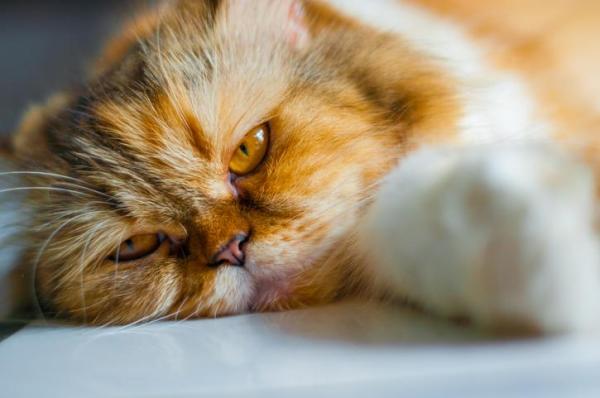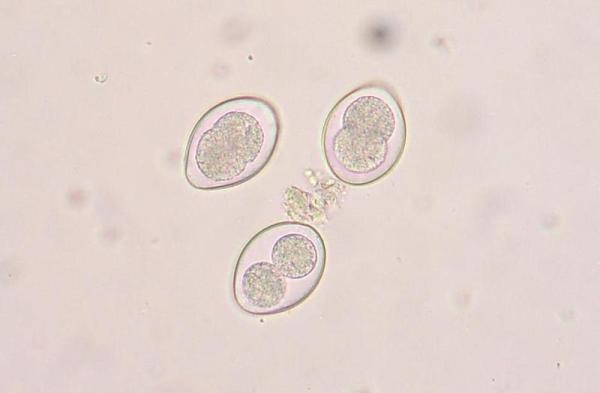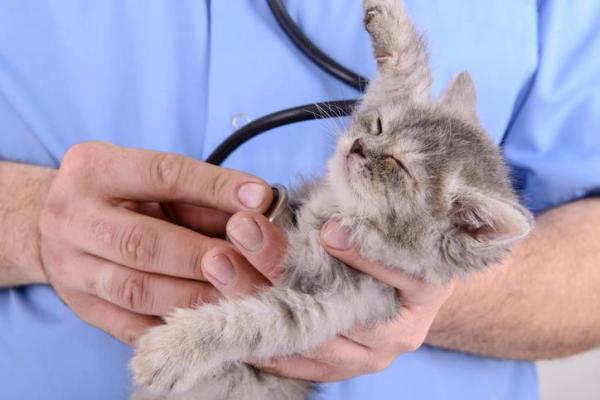
One of the most common cat ailments seen in veterinary clinics is a gastrointestinal problem. With symptoms ranging from very mild to life threatening, better understanding the causes of digestive diseases is essential to maintain cat health throughout their lives. Unfortunately, since the problem stems from an internal issue (even if the the cause is external), distinguishing the underlying cause becomes difficult. This is why why need to discuss causes individually, to help us know when serious action needs to be taken. Coccidia is one such gastrointestinal disorder caused by a particular internal parasite.
At AnimalWised, we ask what is coccidia in cats? To answer the question, we need to consider the causes, symptoms and treatment for coccidia in cats. However, it is important to know that only a veterinarian can provide an accurate diagnosis.
Coccidia in cats?
Coccidia is a parasitic microorganism which is usually located in the small intestine. You may have read articles or seen videos where parasites are removed from a cat. However, you are unlikely to have seen coccidia in this manner. This is because they are intracellular parasites, meaning they are capable of growing inside the actual cells of their host[1]. Moreover, they are obligate intracellular parasites as they are only able to survive in such cells.
Since coccidia is the name of the parasite itself, the infection caused by this parasite is known as coccidiosis. While the disease may begin in the intestine, it is possible it will become systemic and affect the overall well-being of the cat. When coccidiosis in cats is severe, it can be fatal, especially in cats which are already immunodepressed. This is why cats with feline immunodepressive virus (FIV) and feline leukemia virus (FeLV) are at particularly risk.
Symptoms of coccidiosis vary, but one of the most worrying signs is bloody diarrhea. However, often the disease is asymptomatic at first, making it very difficult to determine. This is a considerable factor since early detecting will provide a better prognosis.
Since adult and senior cats are most vulnerable, they are the most at risk when infected with the coccidia parasite. However, otherwise healthy adult cats can have a certain size of coccidia infestation in their intestinal tract without suffering any symptoms.
How is feline coccidiosis spread?
Infectious forms of coccidia are usually found in the feces of infested animals. This is the main source of infection for other susceptible animals. It has also been reported that these infectious forms of the internal parasite can be consumed by smaller animals, such as mice, and are then passed on to the cat through hunting and ingestion of the infected animal[2].
Since the immune system of the cat plays a fundamental role in whether the disease may occur, we need to take measures to ensure it is not spread. Cleaning the litter box is essential, especially in homes where more than one cat is present. It is more difficult to avoid outdoor cats coming in contact with infected feces.
Symptoms of coccidiosis in cats
The symptoms of coccidiosis in cats are similar to other digestive issues. It is most common for a cat guardian to take their cat to the veterinary clinic due to a change in behavior, specifically their refusing to eat. This is because a loss of appetite and apathy are one of the first visible symptoms to manifest. As the microorganisms proliferate and the coccidiosis progresses, we may see:
- Lethargy: in all diseases where blood loss occurs, the animal will like suffer energy loss. This symptom is particularly noticeable in animals which are usually energetic and active. When demotivation and lack of enthusiasm present in a cat, it is a sign that something is wrong, regardless of whether coccidiosis is present.
- Anorexia: it is normal for the animal to lose weight due to the inadequate function of the gastrointestinal system. This process can be protracted or you can see an acute change in only a few days. You will need to go to the veterinarian immediately.
- Diarrhea: due to parasitic processes depleting the cat's immunity, diarrhea is likely. In some cases, due to the intracellular nature of the parasites, the cells of the intestinal wall break down and blood can be found in the cat's stool.
- Abdominal pain: along with fecal blood, one of the most worrisome signs of coccidiosis in cats is abdominal pain. This is because it is most associated with fatal diseases. Due to the function of the parasites in the intestinal tract, it is possible the cat suffers from severe abdominal pain. Unfortunately, it is not always easy to see the signs of pain in cats.
- Fever: if a cat has a raised temperature, it means there is a problem. In relation to coccidiosis, it likely means a secondary infection is also present. Know how to take your cat's temperature at home to learn more.
- Vomiting: similar to diarrhea, the damage to intestines can result in pain, nausea and vomiting.
- Dehydration: diarrhea, vomiting and decreased food and water intake end up causing significant dehydration in the feline patient.
- Tenesmus: these are strong and painful contractions of an organ (in this case the rectum), usually accompanied improper evacuation of stools.
If your cat has any of these symptoms, do not hesitate and take it to the veterinarian to treat the parasitosis as soon as possible.

Diagnosis of coccidia in cats
The disease will need to be diagnosed by a qualified veterinarian. However, this will not be able to happen with a physical examination alone, even if the disease is suspected. The reason for this is the similarity coccidiosis has with other gastrointestinal disorders. Stool and blood samples will need to be taken for laboratory testing.
In the laboratory, the clinician will need to be skillful in observing coccidia eggs in fecal matter. They are very particular and difficult to identify, especially in the early stages. There is also another clinical importance since not all coccidia are pathogenic in cats. This can mean the symptoms are actually caused by another issue, despite the presence of coccidia in the cat's feces.
This is why it is important to know that the presence of coccidia in cat feces does not mean the animal necessarily has coccidiosis. Some adult cats can live peacefully without symptoms despite having these parasites in their system. The blood sample will help to alert the veterinarian to other problems.
Treatment of feline coccidiosis
Some people may ask whether there is a cure for coccidia in cats. If so, they may also wonder how long does it take for coccidia to go away in cats once treatment is implemented. However, the treatment will depend on the individual feline patient and the state of progress of the disease. To begin, symptomatic treatment is required to stop and, hopefully, reverse the damage caused by the parasite. These generally include:
- Fluids: to restore water and electrolyte loss.
- Analgesics: drugs used to help the patient with abdominal pain.
- Vomiting inhibitors: only if the clinical picture warrants usage.
Action is essential since it could mean the life or death of the animal. After this, etiological treatment needs to be carried out. This means we need to fight the coccidia which are causing the disease. Coccidia are susceptible to certain antibiotics belonging to the sulfonamide family. If symptomatic treatment goes well, the prognosis is usually positive. We mustn't forget that each doctor has their own criteria and the specific treatment will depend on the individual circumstances. We should never medicate the cat on our own without express advice from our veterinarian.

Is coccidia in cats contagious to humans?
Prevention of coccidia contagion in cats is best performed by maintaining strict hygiene standards and performing regular deworming. As we stated above, it is difficult to protect outdoor cats due to our inability to monitor them when outside. They may come in contact with infectious material without our knowing it.
We may wonder whether this is enough to prevent coccidia spreading to humans. The type of parasite which most commonly infests cats belongs to the genus Isospora. This is not a zoonotic parasite, i.e. it cannot spread to human beings. However, there are other types of coccidia, even if they are not as common. These include Toxoplasma gondii, an intracellular parasite belonging to the phylum Apicomplexa. This is the cause of toxoplasmosis in cats, one of the most studied zoonotic diseases and one which causes a serious public health problem in humans. Unfortunately, cats are the most significant vector for this parasite[3].

This article is purely informative. AnimalWised does not have the authority to prescribe any veterinary treatment or create a diagnosis. We invite you to take your pet to the veterinarian if they are suffering from any condition or pain.
If you want to read similar articles to What is Coccidia in Cats?, we recommend you visit our Parasitic diseases category.
1. Dubey, J. P., Lindsay, D. S., & Lappin, M. R. (2009). Toxoplasmosis and Other Intestinal Coccidial Infections in Cats and Dogs. Vet Clin North Am Small Anim Pract, 39(6), 1009-1034.
https://www.ncbi.nlm.nih.gov/pubmed/19932360
2. Frenkel, J. K, & Dubey, J. P. (1972). Rodents as Vectors for Feline Coccidia. The Journal of Infectious Diseases, 125(1), 69-72.
https://www.jstor.org/stable/30111655
3. Rahimi, M. T., et al. (2015). Cats and Toxoplasma gondii: A Systematic Review and Meta-Analysis in Iran. Onderstepoort J Vet Res, 82(1), 823.
https://www.ncbi.nlm.nih.gov/pmc/articles/PMC6238687/
1. Cordero del Campillo, M., Rojo Vázquez, F. A. (1999). Veterinary Parasitology. McGraw-Hill.
2. Quiroz, R. H. (1984). Parasitology and Parasitic Diseases of Domestic Animals. Limusa.